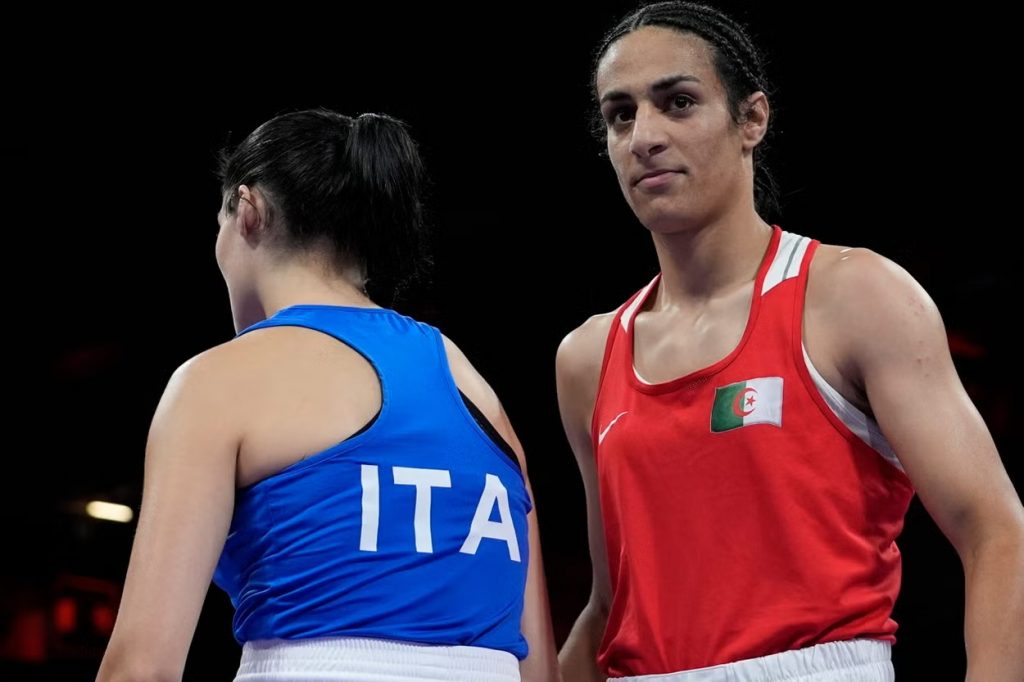Paris – The women’s boxing match that relit an Olympic firestorm about gender and sports lasted just 46 seconds.
Italy’s Angela Carini and Algeria’s Imane Khelif had barely begun their bout when Khelif caught her opponent with a powerful right uppercut followed by a series of jabs and hooks. Carini stayed on her feet, but said she had “never felt a punch like that.”
Less than a minute into Round 1, she walked back to her corner and withdrew from the fight.
Carini never directly accused Khelif of anything. But influential figures on social-media quickly seized on the controversy that followed Khelif into the Paris Games. In 2023, she had been banned from the world championships by the International Boxing Association for failing an unspecified gender test. The IBA also banned Taiwan’s Lin Yu-ting, who won her first bout by unanimous decision on Friday.
The presence of both women at the Games has turned a spotlight on the situation of women who belong to a small group of people born with differences in sex development, or DSD. This means that they have different reproductive anatomy, chromosome patterns or other traits that may not align with typical definitions of female or male. Those differences can vary widely, and some people never know they are DSD, also called intersex. Neither Khelif nor Lin identifies as transgender.

The advantages from DSD can vary widely from person to person, and experts disagree about how prevalent the status is. Some estimate the rate is as low as 1 in 6,000, some as high as 1.7% of the population.
The most prominent case was that of Caster Semenya, the two-time Olympic gold medalist in the 800 meters from South Africa, has a DSD that gives her naturally elevated testosterone levels. World Athletics, the governing body of track and field, responded to her dominance in 2019 by lowering its testosterone thresholds for female athletes competing in distances between 400 meters and one mile. Semenya has decried the limits as unfair.
With regards to Khelif and Lin, the IBA said that its ban was based not on a testosterone test but a separate test it didn’t specify, according to an IBA statement.

The IBA also banned Taiwan’s Lin Yu-ting (L), who won a round of 16 bout on Friday.
“This test conclusively indicated that both athletes did not meet the required necessary eligibility criteria and were found to have competitive advantages over other female competitors,” the IBA said.
Khelif, 25, started boxing after watching the 2016 Rio Olympics. To pay her bus fare for the six-mile ride from her village to the gym, she sold scrap metal for recycling while her mother sold couscous. Khelif reached the quarterfinals in the lightweight (60 kg) division of the 2021 Tokyo Olympics, losing to eventual champion Kellie Harrington of Ireland.
Confusing matters is that boxing is one of the rare sports at the Olympics that isn’t overseen by its own world governing body. That’s because the IOC stripped the IBA of its status a year ago, following persistent and pervasive concerns about corruption and governance issues. Instead, Olympic boxing is being run directly by the IOC, which has a different set of standards that apply to gender testing.
The IOC has no plans to review Khelif and Lin’s place in the Games and instead dismissed the IBA’s decision to ban them in 2023 as “sudden and arbitrary” and without due process.
The IOC added that the two boxers, “have been competing in international boxing competitions for many years in the women’s category.”


